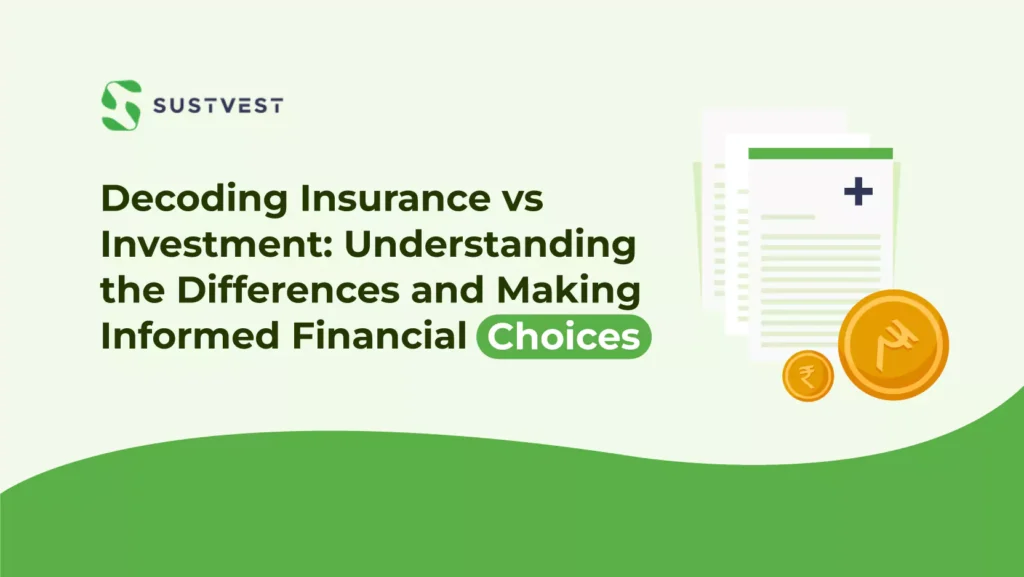
As we enter a specific stage in life, we are faced with the choice between investment and insurance. Often, we receive guidance encouraging us to begin investing at this point. Or asked if insurance has been taken for life coverage or not.
The current dilemma is whether to prioritize investment or insurance. It is a choice between starting with investing or getting insurance. The question is, which one should be given priority? Both options have their advantages. Some argue that investment should be the first choice, while others believe that insurance is the superior option for life protection.
This issue is highly debated. Nevertheless, you need to peruse this article to alleviate any uncertainties regarding these two subjects. The article delves into the benefits of both investment and insurance, enabling you to make an informed decision about your priorities.
What is Insurance?
Insurance is a service that one purchases to guard a person or family against some form of loss. This loss can be in the form of loss of life, property, or health.
The biggest example for instance is car insurance which protects you from financial havoc in case it gets badly damaged or stolen. Depending on the type of car insurance that you get, the insurance company covers the financial damage to the vehicle or replaces your car altogether in some cases.
In the case of Life Insurance, the dependents get a single-sum income when the insured person passes away to provide them at least some financial help at the time of need or provide them with a lump sum amount once the term of the policy ends.
Why Do You Need Insurance Plans?
- Life insurance plans provide financial assistance to the policyholder’s family in case of the policyholder’s unexpected death. Some life insurance plans may also have an investment component (ULIP#) or come with guaranteed returns benefits, thus helping accomplish the family’s financial goals.
- Health insurance policies help you pay for medical emergencies, hospitalisation costs, etc.
- Motor insurance, including car and bike insurance plans, is mandatory for your vehicle to be eligible to run on public roads. Comprehensive plans also safeguard the vehicle, third-party injury or property damage and offer personal cover to the policyholder.
- Home insurance plans offer coverage to your homes in case of accidents, natural calamities or mishaps.
What is investing?
In the case of Investment, it is the amount of money or assets that you give to a third party in exchange for the return of that money or assets along with profit at an agreed point in the future.
There are many kinds of Investment Plans, like Bonds, where you lend your money to a company or government, in return for interest and stocks, where your stake equates to you being part owner of a business.
While Bonds are relatively safer purchase of stocks can earn you a larger profit and are high-risk where returns are not guaranteed.
There are also Mutual Funds where you invest in a mixture of stocks and bonds and is considered mid-risk with mid-returns.
Why Do You Need Investment Plans?
Your investments earn returns, which are reinvested to earn further returns, thus offering you significant returns over a long period. This is called the power of compounding.
- It can act as a source of second income.
- It helps you achieve your financial goals.
- Long-term investments can beat inflation and fight against market fluctuations.
Should you Insure or Invest First?
To know which to choose first between Insurance and Investment, you have to identify and understand your financial goal.
In general, it is advisable to first establish a solid foundation of insurance coverage before diving into investments.
Insurance serves as a safety net, protecting you and your loved ones from unexpected events and creating a financial cushion that gives you peace of mind.
Once you have a solid insurance plan in place, you can focus on building your investment portfolio. Investments offer the opportunity to grow your wealth over time and achieve long-term financial goals.
However, it’s crucial to strike a balance between risk and reward, diversify your investments, and seek professional advice to make informed decisions aligned with your risk tolerance.
Insurance vs Investment
As mentioned above, insurance is of different types, each serving a different purpose. For ease of understanding and finding common ground for comparison, we shall differentiate between investments and life insurance plans.
The below table will help you understand the difference between life insurance and investment.
| Parameter | Life Insurance | Investment |
| Meaning | It is a protection tool that safeguards the financial stability of your family in your absence. | It is a financial product to help you create sustainable wealth for the future. |
| Purpose | Life insurance policies offer financial security to your dependents, like parents or children and reduce financial burden in your absence. | Investments help you meet your long-term financial goals like purchasing a house, your child’s education, starting a business, etc. |
| Risk factor | Traditional life insurance policies involve low to negligible risks, and the nominee will get death benefits if all premium payments are made on time. | Investment products carry risk depending on the type of option selected. |
| Common types | Term InsuranceEndowment InsuranceWhole Life InsuranceChild Life Insurance PlansMoney Back PlansPension PlansUnit Linked Insurance (ULIPs#) | StocksBondsMutual FundsFixed Deposits,Real Estate investmentsPublic Provident Fund (PPF)Unit Linked Insurance Plan (ULIPs#) |
| Returns | The returns from a life insurance policy include the death benefit, maturity benefit and bonus accrued over time. The overall return is relatively low. | You may enjoy higher returns if invested wisely. Diversification and time horizons play vital roles in overall returns. |
From the difference between insurance and investment, it can be said that both insurance and investment plans are essential and effective instruments that help you fulfil financial goals or simply ensure monetary security for a rainy day. Therefore, there is no correct answer to which one is better.
While insurance products are highly essential to avoid expense burdens and secure finances for you and your family, investments could be necessary to build and increase wealth, have a second source of income or keep up in the inflationary environment.
From a financial standpoint, the roles played by both insurance and investment are on opposite ends of the spectrum.
Insurance is meant to protect us financially when we cannot work and provide a flow of income for our families and ourselves. Investment allows us to earn additional returns on top of the salary we earn in our day jobs.
In other words, insurance protects our potential downside while investment increases our potential upside.
FAQ: Insurance vs. Investment
Can I get the dual benefits of insurance and an investment plan from a single purchase?
Yes. In a ULIP, your insurer will provide your nominees the sum assured as a death benefit if an unfortunate event occurs. Otherwise, you get back the investment returns on stocks or government bonds or debt mutual funds as per your choice. The profit returns from these investments can also be withdrawn after a lock-in period of 5 years.
Is insurance an asset or investment?
Based on the type of insurance you purchase, it can work both as an asset and an investment. For instance, in whole life insurance, the premiums you pay are accumulated and build value over time, creating an asset for future goals and needs. On the other hand, plans such as ULIPs can be a compelling investment as they offer high returns from market profits and the sum assured.
Which is better insurance and investment?
This depends on your needs. If you plan to boost your finances for the near future, then investments are a better option.
Conversely, if you are looking for monetary protection for yourself and your family in the long run, then insurance is the right option.
Conclusion
Nowadays, insurance and investments form the crux of a financial plan and have become inseparable parts of modern living. The reason why you must opt for insurance or investment products varies, but having both is crucial. Hence, it is always recommended to set your goals and choose the correct insurance plan or investment avenue that best aligns with them. Investment can be considered a tool for achieving financial goals, whereas insurance can be considered financial aid.

Founder of Sustvest
Hardik completed his B.Tech from BITS Pilani. Keeping the current global scenario, the growth of renewable energy in mind, and people looking for investment opportunities in mind he founded SustVest ( formerly, Solar Grid X ) in 2018. This venture led him to achieve the ‘Emerging Fintech Talent of the Year in MENA region ‘ in October 2019.




